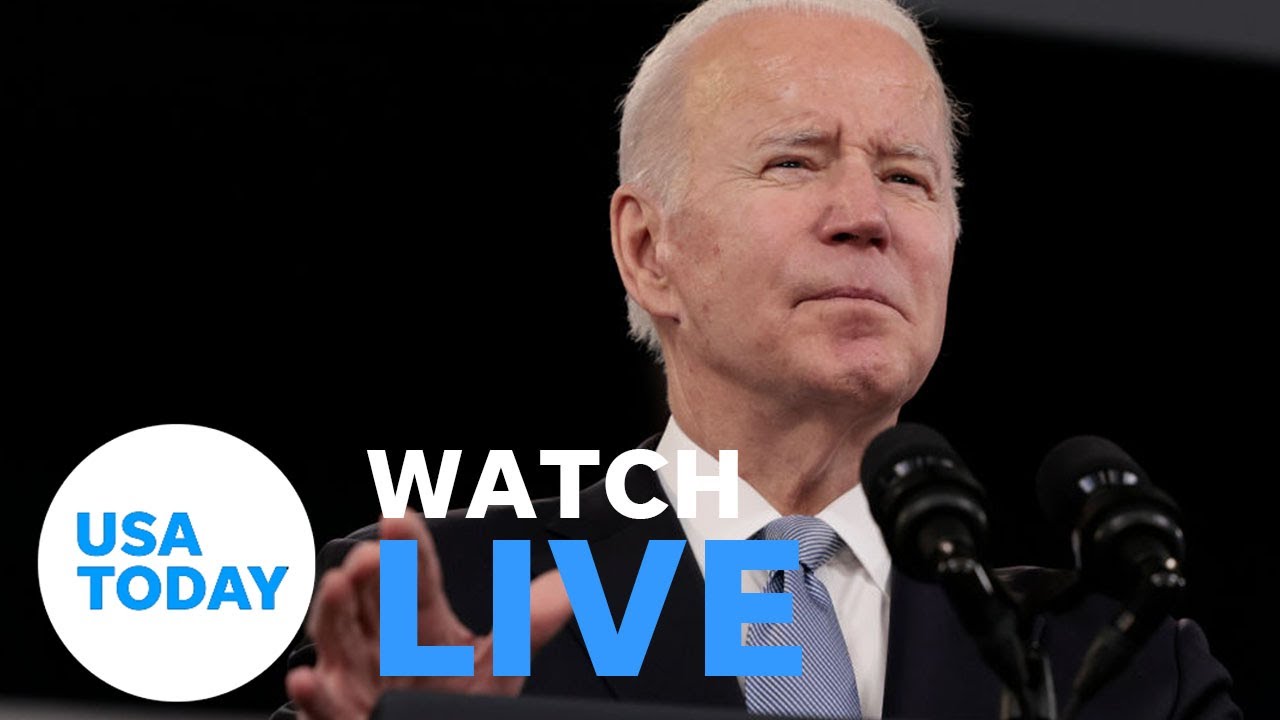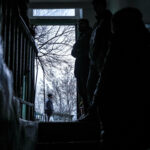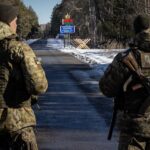- More US sanctions against Russia are expected to be announced ‘within hours.’
- German chancellor says the government will ‘reassess’ certification of Nord Stream 2.
- UN Security Council holds emergency session, noting ‘risk of major conflict is real.’
President Joe Biden will address the crisis with Russia and Ukraine on Tuesday afternoon. It comes hours after the White House signaled it considers Moscow’s actions in Ukraine to be an invasion, noting a “severe response” is in the works.
President Vladimir Putin on Tuesday recieved authorization from the upper chamber of parliament to use Russian troops outside of the country. He told reporters this was necessary to formalize the military’s deployment in two rebel regions of eastern Ukraine, which Russia recognized as independent on Monday.
The White House described the provocations as an invasion of Ukraine.
“I am calling it an invasion,” deputy national security adviser Jon Finer told CNN. He said, “sanctions on Russia will be rolling out in a matter of hours.”
Here’s what you need to know about the crisis between Russia and Ukraine:
- President Joe Biden will talk at 1 p.m. from the East Room of the White House.
- A US national security official called Putin’s actions ‘the beginning’ of ‘Russia’s latest invasion’ into Ukraine, adding that diplomacy is now more difficult.
- The White House is expected to lay out new sanctions on Tuesday in response to Putin’s actions.
- Russian lawmakers have approved President Vladimir Putin’s request for permission to use Russian troops outside of the country.
- In a significant move, Germany will stop certification of the Russian-owned Nord Stream 2 gas pipeline.
- The UN Security Council met late Monday in an emergency session, with many members condemning the Kremlin’s actions.
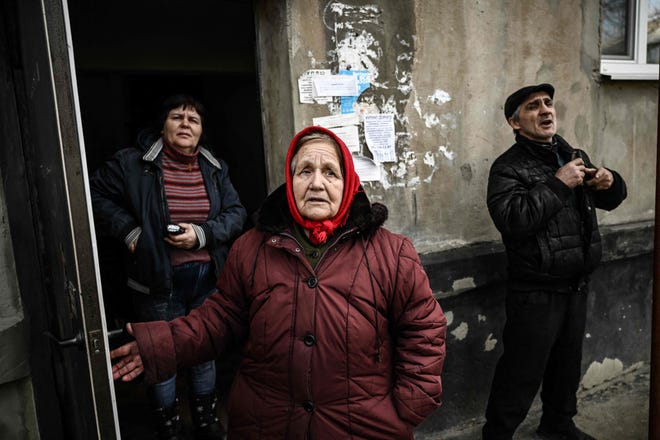
►Russia-Ukraine explained:Inside the crisis as US calls Russian movements an invasion
►More:The enigma of Vladimir Putin: What do we really know about Russia’s leader?
Putin wants recognition of Crimea
Putin called Tuesday for international recognition of Crimea as part of Russia.
He claimed Russia’s 2014 annexation of Ukraine’s Crimean Peninsula should be recognized globally as legitimate, a reflection of the local population’s choice, likening it to a vote for Kosovo independence. The annexation has been widely condemned by Western powers as a breach of international law.
He also called for an end to Ukraine’s NATO membership bid, suggestion Ukraine should be neutral. The Russian leader also called for a halt to weapons shipments there.
– Associated Press
Putin asks to use troops outside Russia
Russia’s upper house of Parliament has granted Putin’s request for a permission to use military force outside the country. Putin asked lawmakers to formalize a Russian military deployment to rebel regions in eastern Ukraine, a day after the Russian leader recognized their independence.
In a press conference Tuesday, Putin said the move was needed to help in the Donetsk and Luhansk regions.
– Associated Press
Biden will speak on crisis with Russia
President Joe Biden will speak to the nation about Russia and Ukraine on Tuesday afternoon as tensions escalate in the ongoing conflict.
Biden is scheduled to give an update at 1 p.m. from the East Room of the White House. The White House has promised “swift and severe” economic sanctions in response to any Russian invasion.
Biden’s remarks will come as a White House official called Russia’s actions in eastern Ukraine an invasion.
– Rick Rouan
UK unveils sanctions on 5 Russian banks, 3 individuals
British Prime Minister Boris Johnson announced new sanctions against five Russian banks and three wealthy individuals in the latest international backlash to Putin’s decision to send troops into eastern Ukraine.
In a speech to lawmakers Tuesday in the House of Commons, Johnson said Moscow’s actions “amount to a renewed invasion of that country.” The prime minister described the measures as “the first tranche, the first barrage of what we are prepared to do,” adding the British government is prepared to impose more sanctions if the situation escalates further.
The measures target Rossiya, IS Bank, General Bank, Promsvyazbank and the Black Sea Bank.
Three “very high net worth” individuals were also hit: Gennady Timchenko, Boris Rotenberg and Igor Rotenberg. Any assets the individuals hold in the U.K. will be frozen, and they will be banned from traveling to the country, while all U.K. individuals and entities will be prohibited from having dealings with them, according to Johnson.
He added Western allies would continue to seek a diplomatic solution “until the last possible moment, but we have to face the possibility that none of our messages have been heeded and that Putin is implacably determined to go further in subjugating and tormenting Ukraine.”
– Courtney Subramanian

US: Diplomacy now harder, but isn’t off the table
A White House national security adviser said Tuesday that Russia’s invasion of Ukraine has made it harder to pursue a diplomatic solution to the conflict, but the U.S. would not close the door on diplomacy.
Speaking to CNN’s Brianna Keilar, deputy national security adviser Jon Finer said additional economic sanctions against Russia were forthcoming on Tuesday in response to what he described as “the beginning” of “Russia’s latest invasion into Ukraine.”
“What Russia has done has made a diplomatic path much harder to walk down and much less likely,” Finer told Keilar.
He said Russia’s action on Monday “has closed the door even further to diplomacy” as it moved closer to war.
“We are not going to slam that door shut. We continue to believe that is the best way for this conflict to de-escalate rather than Russia continuing down the path to war,” he said. “They have given every indication they are on a different course.”
– Rick Rouan
Germany halts Nord Stream 2
German Chancellor Olaf Scholz said his government would “reassess” the certification of the Nord Stream 2 pipeline, which hasn’t begun operating yet.
The $11 billion, Russian-owned natural gas pipeline snakes westward from Russia to northeastern Germany for more than 700 miles under the Baltic Sea. The pipeline was launched in 2015 and follows a similar route to another pipeline, Nord Stream 1, which was completed in 2011.
Owned by Gazprom, a Russian state-controlled company, Nord Stream 2 was completed last year and has the capacity to handle 55 billion cubic meters of gas per year once it becomes operational.
The decision is a significant move for the German government, which had long resisted pulling the plug on the project despite pressure from the United States and some European countries to do so.
Scholz said that the government had decided to “reassess” the certification of the pipeline, which hasn’t begun operating yet, in light of the latest developments.
Germany meets about a quarter of its energy needs with natural gas, a share that will increase in the coming years as the country switches off its last three nuclear power plants and phases out the use of coal. About half of the natural gas used in Germany comes from Russia.
Russian lawmakers formalize Putin’s actions
A day after Putin declared Moscow would recognize the independence of Donetsk and Luhansk, Russian lawmakers ratified the arrangement, allowing for the Kremlin to provide military support there.
Putin ordered troops Monday to “maintain peace” in the provinces shortly after recognizing the Russian-backed areas as independent, stoking fears that a Russian invasion could be coming soon. Convoys of armored vehicles were seen rolling across the separatist-controlled territories late Monday. It wasn’t immediately clear if they were Russian.
More:How the Nord Stream 2 pipeline became a bargaining chip in the crisis between Russia and Ukraine
UN Security Council meets in emergency session
The U.N. Security Council held an emergency meeting Monday night at the request of Ukraine, the United States and six other countries, including Russia, which holds the rotating council presidency.
Undersecretary-General Rosemary DiCarlo opened the session late Monday with a warning that “the risk of major conflict is real and needs to be prevented at all costs.”
U.S. Ambassador Linda Thomas-Greenfield said Putin “has put before the world a choice” and it “must not look away” because “history tells us that looking the other way in the face of such hostility will be a far more costly path.”
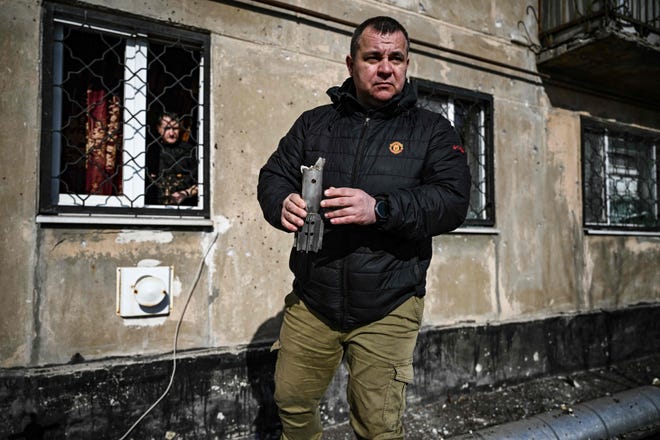
More:Putin orders troops to two Ukraine regions after declaring their independence
Ukraine’s U.N. ambassador demanded that Russia cancel its recognition of the independence of the separatist regions in the east, immediately withdraw its “occupation troops” and return to negotiations.
Russia’s U.N. ambassador, Vassily Nebenzia, said Putin acted in response to Ukrainian aggression. He said Russia was open to diplomacy but wouldn’t allow “a new bloodbath in the Donbas.”
China’s U.N. Ambassador Zhang Jun called for restraint and a diplomatic solution to the crisis.
Blinken to meet Ukrainian counterpart
Ukraine’s President Volodymyr Zelenskyy sought to project calm, telling the country in an address overnight: “We are not afraid of anyone or anything. We don’t owe anyone anything. And we won’t give anything to anyone.”
His foreign minister, Dmytro Kuleba, will be in Washington on Tuesday to meet with Secretary of State Antony Blinken, the State Department said.
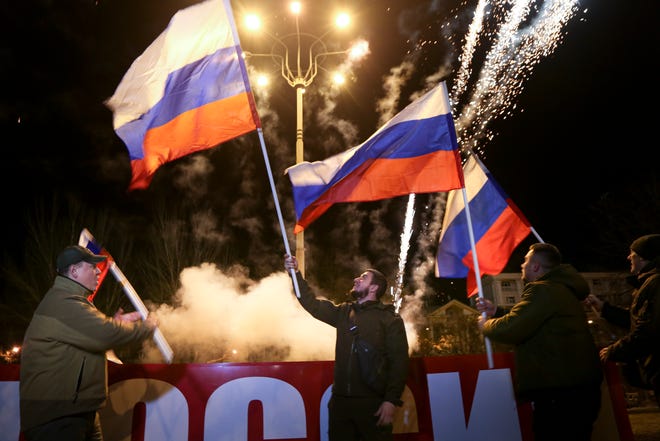
Putin recognizes Donetsk, Luhansk
In a lengthy speech on Monday, Putin justified his decision to recognize the independence of the Russian-backed separatist regions Luhansk and Donetsk. He blamed NATO for the current crisis and called the U.S.-led alliance an existential threat to Russia.
Putin directly threatened pro-democracy activists and civil servants who had led the pro-democracy push in the country after the 2014 revolution ousting a pro-Russian government.
“We know their names, and we will find them and bring them to justice,” he said.
The Russian president also claimed, without evidence, that Ukraine was preparing to develop its own nuclear weapons that could threaten Russia.
Contributing: Matthew Brown, Joey Garrison, USA TODAY; Associated Press

